One of the most important lwa spirits in Vodou, Papa Legba is believed to be an intermediary that allows humankind to communicate with the spirits.
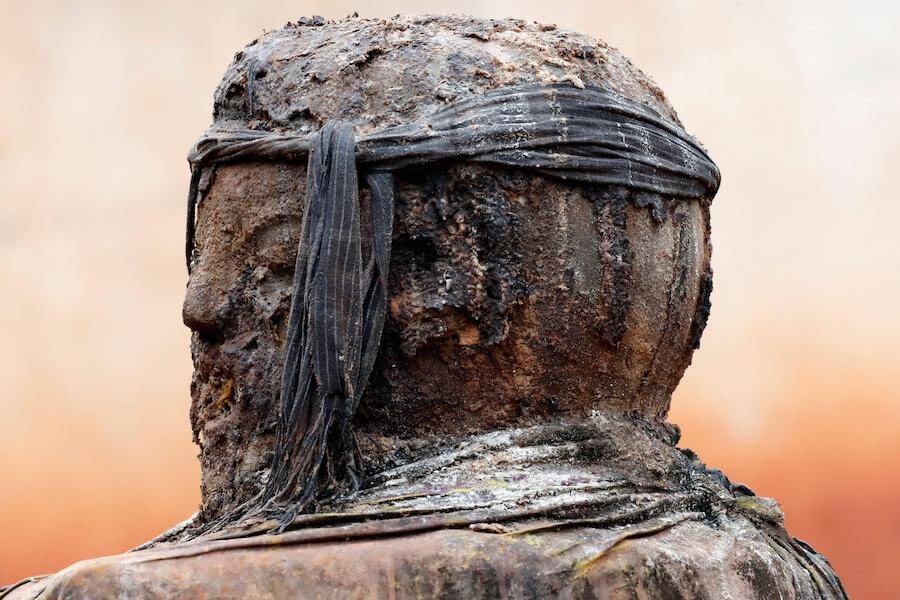
Godong/Alamy Stock PhotoA depiction of Papa Legba, which was created to protect a home in Togoville, Togo.
Practitioners of Haitian Vodou believe in a supreme creator, Bondye, which is similar to the French term for “Good God.” However, the supreme creator does not interfere in human affairs. For that, there are lwa, or spirits that act as intermediaries of sorts between Bondye and humanity. Perhaps the most important lwa in Vodou tradition is Papa Legba.
He is the gatekeeper between the human and spirit worlds, and no human can reach the other spirits without Papa Legba’s permission. At the spiritual crossroads, Papa Legba decides whether a person is allowed to speak with other spirits. Believed to speak all human languages, Papa Legba is known to the Haitians as the great elocutioner, or public speaker.
Papa Legba’s fluency in all languages is a facet of his story that is intrinsically tied into the history of the land from which his legend originated. Though his story began in West Africa, it found its way to the Americas when European settlers brought enslaved people to the “New World,” including the Caribbean. Though some of the slaves’ spiritual beliefs differed, they eventually mixed together, bringing a sense of commonality and community.
Centuries later, Papa Legba’s story is still relevant in Haitian Vodou and other West African diasporic religions — and for good reason.
The Origins Of Papa Legba, From West Africa To Haitian Vodou
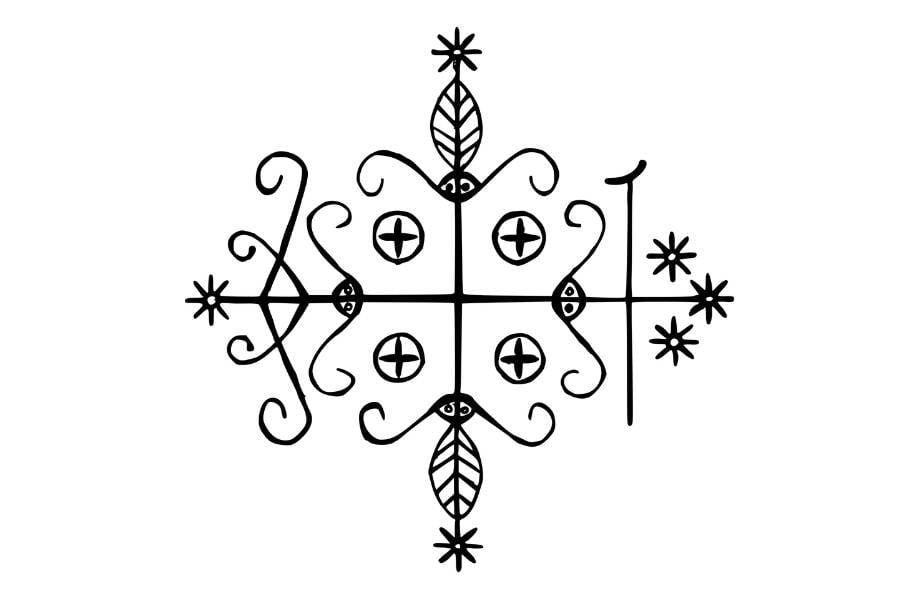
Wikimedia CommonsThe vèvè, or symbol, of Papa Legba.
Papa Legba’s origins are often traced back to the West African kingdom of Dahomey, now known as Benin. Amidst the transatlantic slave trade, which took place between the 16th and 19th centuries, the practice of Haitian Vodou emerged among enslaved people in modern-day Haiti. More than a religion, Haitian Vodou also encompassed philosophy, justice, and medicine. Like other forms of Vodou (sometimes spelled Voodoo), the general belief of Haitian Vodou is that humans are spirits who inhabit the physical world.
Then, there are the lwa (spirits of an unseen world), the mystè (mysteries), the anvizib (invisibles), the zanj (angels), and, finally, the spirits of deceased people. These spiritual beings are believed to reside in a cosmic version of Africa — or at least, a land similar to Africa — known as Ginen.
In Haitian Vodou and other West African diasporic religions, there is often intermingling between traditional West African religions and Roman Catholicism. As a result, many Vodou beliefs are associated with Catholic traditions. Bondye, the supreme creator, is often compared to the Christian God, and the lwa are seen as being similar to saints.
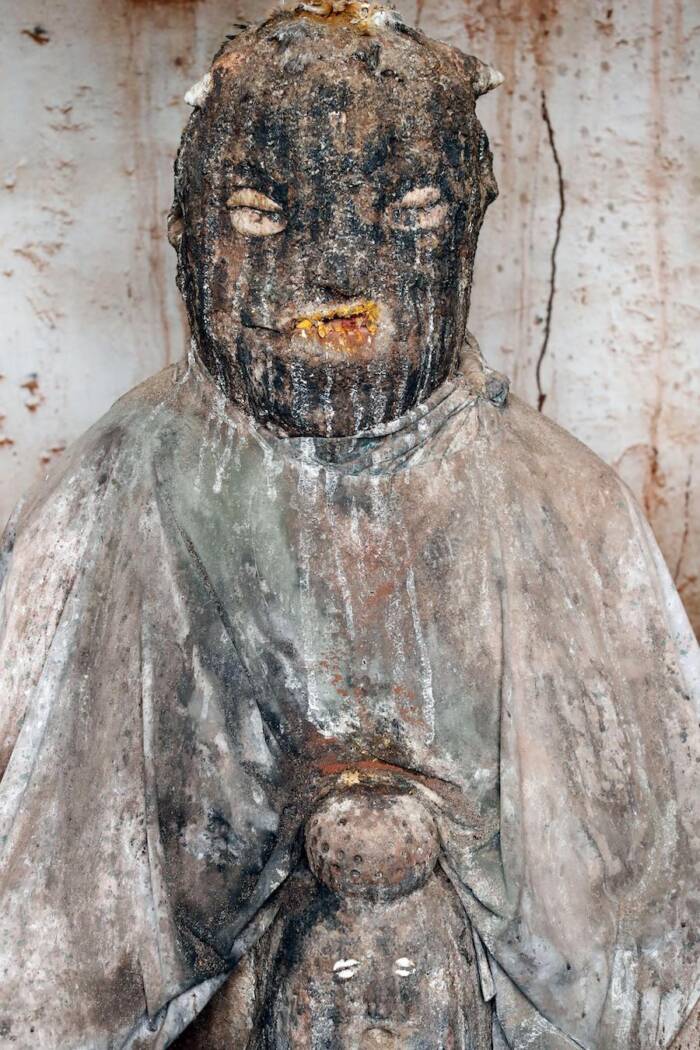
robertharding/Alamy Stock PhotoA depiction of Papa Legba in Togoville, Togo.
As for Papa Legba, he is most often associated with St. Peter, who is said to be the gatekeeper of Heaven. In other instances, he is linked with St. Lazarus, a disciple of Jesus who was said to have been resurrected by the Christian Messiah, or St. Anthony, the patron saint of lost things.
The main goal of Vodou is to sevi lwa, or “serve the spirits.” This means practitioners should offer prayers to and perform devotional rites for God and other spirits for protection, health, or favor — including Papa Legba.
Papa Legba is traditionally depicted as an old man, dressed in rags and smoking a pipe. He often needs to lean on a crutch or a cane to walk.
While he may appear frail and weak at first glance, he is actually one of the most powerful spirits in the Vodou tradition. He only walks with a limp because he inhabits two worlds at once, the human realm and the spirit realm. The cane that he leans on is not an ordinary cane — it is said to actually be the gateway between the human world and the heavens.
The Role Of Papa Legba In Traditional Vodou
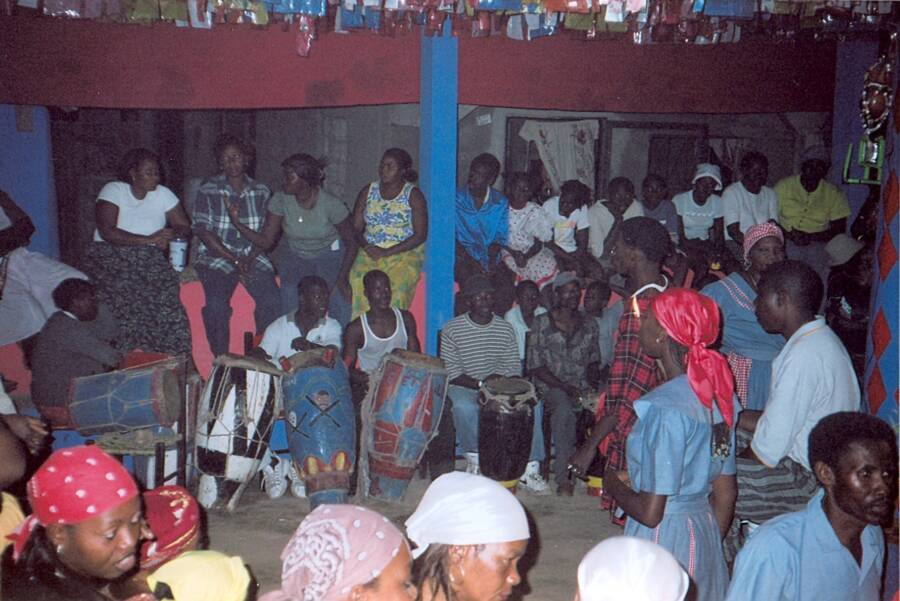
Wikimedia CommonsA Vodou ceremony in Jacmel, Haiti.
In Haitian Vodou, Papa Legba is the great communicator. He speaks all the languages of the world and the languages of the spirits. A central lwa and mediator, he alone opens the door to let all the other spirits into the human world. Therefore, many ceremonies begin with an offering to Papa Legba, so he will keep the door open and let the other spirits into the world.
Although he commands respect, he is seen as a mostly benevolent, fatherly figure, and it does not take much to appease him.
He is not a very demanding spirit, but he is sometimes depicted as a trickster who is fond of riddles. He also likes to deal with uncertainty and confusion. Sometimes, his messages can be distorted or misunderstood.
All lwa can show a negative side if they are not treated with respect, and Papa Legba is no exception. Because of this, Vodou practitioners believe it is essential to show proper reverence for Papa Legba so that he will remain benevolent and keep the gates of the spirit world open.
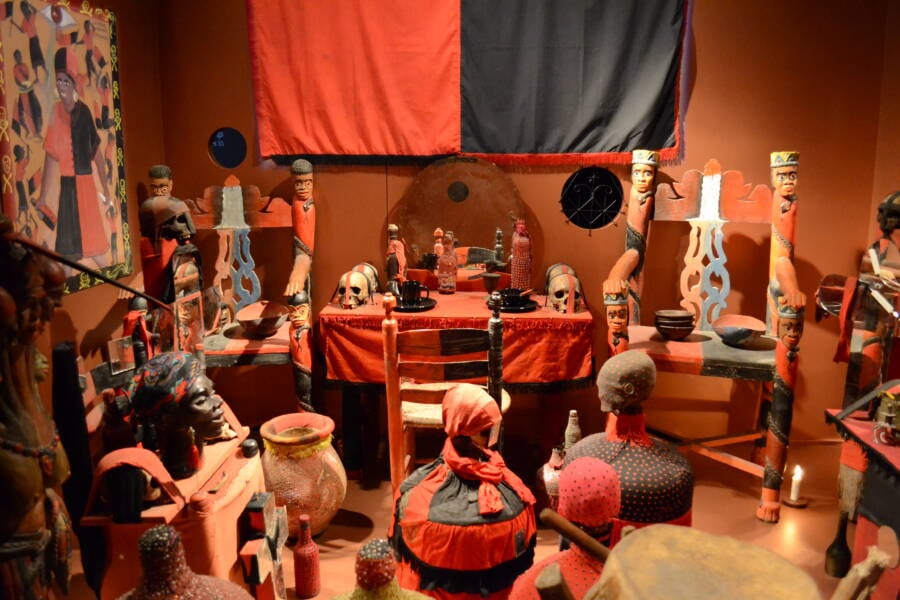
Wikimedia CommonsA collection of Haitian Vodou artifacts at the Canadian Museum of Civilization (now the Canadian Museum of History).
Papa Legba can be honored with a small offering of drinks or food, like coffee or plantains, during ceremonies, or by simply lighting a candle, acknowledging him, and asking for his help. There are some varying beliefs regarding the specifics of honoring Papa Legba, but the colors most often associated with him are black and red, white and red, or yellow.
There is also some disagreement on what day is best to pay him homage. Some say it’s Monday, while others believe it’s Tuesday or Wednesday. This often differs from household to household, depending on what Papa Legba has purportedly said to the specific family honoring him.
Papa Legba stands at the crossroads. There is no denying he has one of the most important roles in the Vodou tradition. He is the intermediary, the messenger, and without him, the door to the spirit world would remain closed to every person trying to communicate with those in the heavens.
One of the most popular chants to summon him goes as follows:
Papa Legba, Open the gate for me/
Atibon Legba, Open the gate for me/
Open the gate for me/
Papa that I may pass/
When I return I will thank the Lwa.
How Papa Legba Has Evolved Over The Years
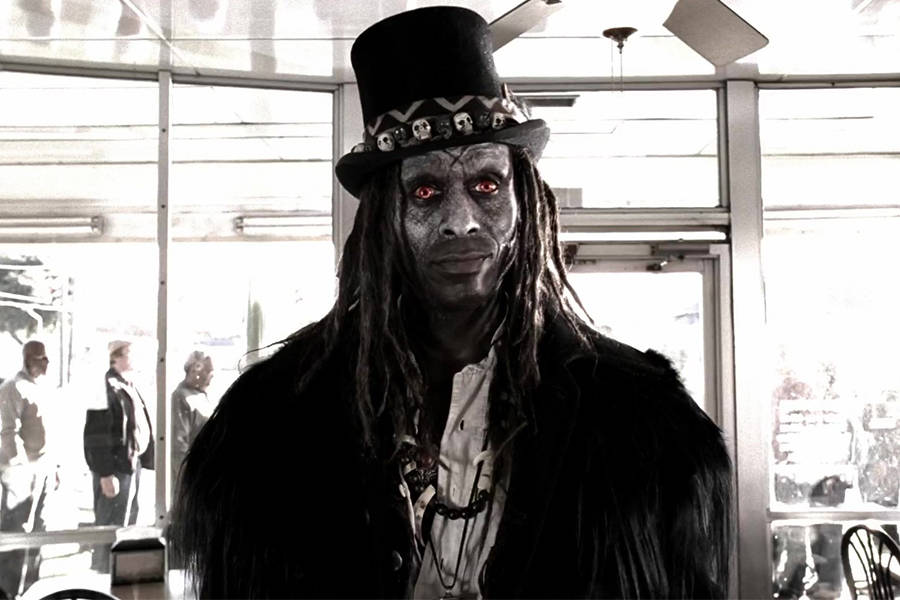
FlickrA depiction of Papa Legba on American Horror Story, which has been strongly criticized for its inaccuracy.
Given how much the landscape of the world has changed since Haitian Vodou emerged, so too has the religion. While Papa Legba’s role as an intermediary is the most common version of his story, it is not the only one.
For example, in many parts of Africa, earlier versions of Papa Legba saw him depicted as a fertility god or a trickster. Sometimes, he was seen as a protector of children or a healer. Some depictions have even shown him as female instead of male. But Papa Legba as he is known today falls more in line with his roles as a crossroads spirit and a gatekeeper of the spirit world.
His importance is still emphasized in Haitian Vodou as well as New Orleans Voodoo (also known as Louisiana Voodoo) and Santeria. Interestingly enough, Papa Legba has also made some appearances in modern pop culture.
He’s been mentioned in some early 20th-century blues songs, and some musical folklorists have claimed that Robert Johnson’s song “Me and the Devil Blues” references Papa Legba. He’s also been referenced in books like Neil Gaiman’s American Gods and Terry Pratchett’s Witches Abroad.
More recently, he’s been depicted in the show American Horror Story, though many viewers complained that his portrayal was wildly inaccurate. In the show, he was given a frightening appearance, complete with glowing red eyes and a top hat decorated with skulls. Some viewers even pointed out that the depiction was actually closer to Bawon Samdi (also spelled Baron Samedi), another Vodou spirit who is said to be the master of the dead.
But while some pop culture depictions portray Papa Legba as sinister or even evil, he remains one of the most revered lwa among Vodou practitioners today. He’s also gained popularity among others who are fascinated with the topic of spirits or the afterlife. Though he’s not the only legendary figure from history said to act as an intermediary between the human realm and the spiritual realm, he’s certainly one of the most fascinating — and he’s also one of the most misunderstood.
After learning about Papa Legba, go inside the history of spirit photography. Then, read about the dybbuk, the “clinging spirit” of Jewish myth.





